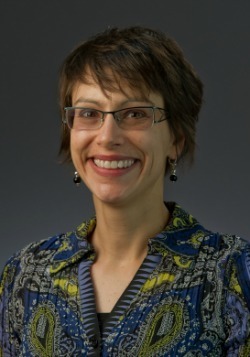Kathleen Eggleson, who earned her undergraduate degree in Biological Sciences at Notre Dame, was conducting research on malaria for her Ph.D. when she recognized the vast complexity of fighting disease in the real world far beyond the laboratory.

“As much as we thought we were all working for a cure for malaria, it was a much more complicated problem than science could solve by itself,” she says. “Science was part of the solution, but there are other parts there – climate, culture, poverty, ineffective government—other factors that require a human side of approaching the problem. I wanted to be part of this effort to serve on the human side and the science side, to use the talents I have to attack the big problems that cause suffering. I woke up to the fact that this is a human problem as much as it is a problem with the pathogenic organism. We’re failing on the human side to do what we can do to take advantage of the progress we’re making in science and engineering.”
Eggleson took the earliest opportunity to make an academic career move integrating science and ethics, becoming Associate Director of the Reilly Center for Science, Technology, and Values in 2009. She advanced within the University in 2011, continuing this focus in the Center for Nano Science and Technology (NDnano). This year, she will teach Technology and Ethics, an ESTEEM course that she co-taught last year with College of Engineering Dean Peter Kilpatrick.
Ethics is a vital dimension of entrepreneurship education, along with technical expertise and business skills, Eggleson says.
“This is just where my interests are, and just the sort of course I should be teaching and the student population I’m excited to reach,” she says. “Their decisions will have big impacts, and they’re each really motivated to make their mark on the world. This is a great time to encounter them and have an adult conversation about ethics; I want to give them more tools to bring sophisticated ethical decision making into their careers, wherever they go next.”
The course includes both fundamentals of ethical frameworks and practical considerations of the impact of new discoveries and applications. Technology topics focus on the 21st century emerging NBIC technologies—nanotechnology, biotechnology, information technology, and cognitive science. They will discuss issues raised by breakthroughs allowing the design and construction of living organisms (synthetic biology), forms of life that bypass evolution, ecological balance, and other potent forces that shape natural life. They will also explore ethical concerns surrounding human enhancement, where technologies altering human life may go far beyond the healing and repair associated with medicine to an expanded range of ‘better-than-well’ states.
“It’s a dramatic moment for science,” Eggleson says. “There will be unintended consequences, and we don’t necessarily know what we would need to know to anticipate them –yet we are making decisions pertaining to these technologies now. There are some fundamental questions that are unresolved. What do we owe future generations? You can anticipate some potential outcomes and make decisions to be prepared for them or design around them, but these measures also have costs and associated uncertainty. The complexity is formidable.
“These ESTEEM students are some of the people who have to be at the table facing the big-picture problems we face as a global community. We need trained minds working on those problems. Their decisions have consequences for many stakeholders, not just themselves: ‘What should we do? What are we responsible for doing? And how do I decide when it gets really complex?’ That’s how I want to send them off to their careers.”